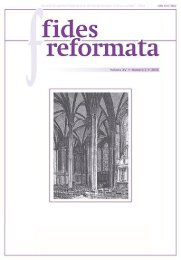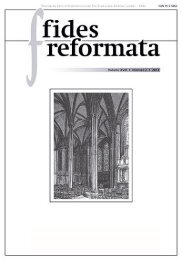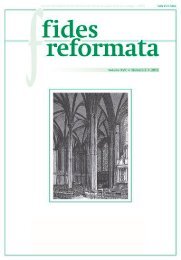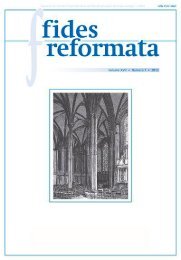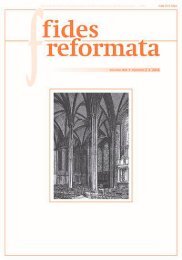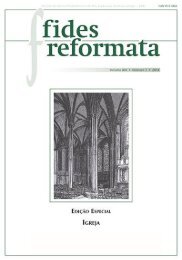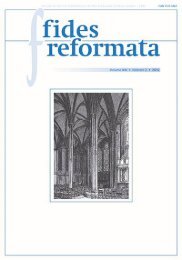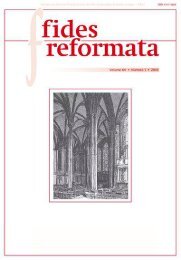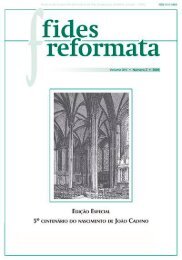You also want an ePaper? Increase the reach of your titles
YUMPU automatically turns print PDFs into web optimized ePapers that Google loves.
FIDES REFORMATA XX, Nº 1 (<strong>20</strong>15): 89-105<br />
instance of different terminology is when Calvin calls Noah “the stipulator<br />
of the covenant.” 35 He uses this term to describe Noah as the subject with whom<br />
the covenant is being made and that his sons are incorporated to the agreement<br />
by association. Although the word can be used in reference to one who accepts<br />
a deal without requiring any kind of guarantee, in later developments of the<br />
<strong>do</strong>ctrine of the covenant the word was used mainly in reference to Yahweh’s<br />
role of setting up the details of the agreement. 36<br />
The parties of the Noahic Covenant, for Calvin, are God and Noah. As<br />
already noted, Noah’s family and the animals are part of God’s promise (or,<br />
using Calvin’s terminology, condition) to Noah in order to encourage him to<br />
present obedience and future hope. This is why this covenant results in both<br />
human and cosmic preservation. 37 But Calvin observes that the entrance of<br />
Noah’s family into the covenant has a “subordinated place.” Noah’s sons and<br />
their wives are “joined with their father” and are “associated with him.” 38 It<br />
seems that Calvin considers Noah as the federal head of his family, like Adam,<br />
and his posterity, both near and far, participate with him in the covenant. Calvin<br />
uses this conclusion in order to refute the Anabaptists, who reject infant baptism<br />
35 Calvin, Commentaries on Genesis, 1:297.<br />
36 One of the first Reformed creeds to give attention to the <strong>do</strong>ctrine of the covenant was the<br />
Erlauthaler Confession of 1562. It expresses in concise but precise form what was understood by a divine<br />
covenant. According to Peter De Jong, in it “God the Father is recognized as ‘stipulator et promissor.’<br />
However, since in all covenant there are two parts, so too in the new covenant of God with man there<br />
are obligations which must be met. Recognizing and elaborating upon this the confession states: ‘In<br />
nove foedere Deus stipulator est, Christus autem factor obligator nostro nomine.’” Peter Y. De Jong, The<br />
Covenant Idea in New England Theology, 16<strong>20</strong>-1847 (Grand Rapids, MI: Wm. B. Eerdmans, 1945),<br />
30. In this sense, stipulator means the one who begins the arrangement and set its requirements. In<br />
the seventeenth-century, Johannes Cocceius seems to be the one who, using Roman law terminology,<br />
applies the term stipulator only to God meaning “the initiator, the one who lays <strong>do</strong>wn the conditions<br />
of the agreement.” And to man he applies the term astipulator, who consents to the conditions laid<br />
<strong>do</strong>wn by the stipulator. Charles S. McCoy, “The Covenant Theology of Johannes Cocceius” (PhD<br />
diss., Yale University, 1957), 157-194. See particularly 169n2. Calvin uses to term in reference to God<br />
in his commentary to the prophecy of Malachi. There he explains the divine covenant in terms of the<br />
marriage covenant. He affirms that “God is as it were the stipulator, who by his authority joins the man<br />
to the woman, and sanctions the alliance.” John Calvin, Commentaries on the Twelve Minor Prophets,<br />
trans. John Owen, vol. 5 (Grand Rapids, MI: Baker Book House, <strong>20</strong>05), 553. It seems that here Calvin<br />
acknowledges God’s role as one who officially unites and bonds a couple in their marital vows. The notion<br />
of an initiator and one who dictates obligations seems to be absent here. In his excellent historical<br />
study of covenant theology, <strong>Andrew</strong> Woolsey explains that there was in Calvin’s covenantal thought<br />
the idea of “mutual stipulations.” But, used in this sense, the word means condition instead of initiation.<br />
<strong>Andrew</strong> A. Woolsey, Unity and Continuity in Covenantal Thought: a Study in the Reformed Tradition<br />
to the Westminster Assembly (Grand Rapids, MI: Reformation Heritage Books, <strong>20</strong>12), 306-317.<br />
37 “In other words, the world today <strong>do</strong>es not survive apart from the power of that covenant God<br />
placed between men and himself…he wants to preserve us and all living creatures because of his infinite<br />
goodness even though we deserve to be exterminated.” Calvin, Sermons on Genesis 1 to 11, 752.<br />
38 Calvin, Commentaries on Genesis, 1:297.<br />
97





